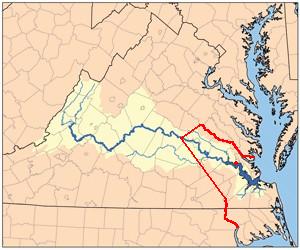Colony of Virginia
English colonial possession in North America (1607–1776)
The Colony of Virginia was the first permanent English settlement in the Americas, established by the Virginia Company in 1607. It was located on the east coast of what is now the United States, primarily in the area that is now the state of Virginia. The colony played a significant role in the history of the United States, particularly in the development of democratic governance and the institution of slavery.
History[edit | edit source]
Founding and Early Years[edit | edit source]
The Colony of Virginia was founded with the establishment of Jamestown on May 14, 1607. The settlement was named in honor of King James I. The early years were marked by severe hardships, including conflicts with the Powhatan Confederacy, disease, and food shortages. The colony's survival was largely due to the leadership of John Smith and the introduction of tobacco cultivation by John Rolfe.
Transition to a Crown Colony[edit | edit source]
In 1624, the Virginia Company's charter was revoked, and Virginia became a royal colony under the direct control of the English crown. This transition marked the beginning of more stable governance and economic growth, largely driven by the tobacco industry.
Growth and Development[edit | edit source]
Throughout the 17th century, the colony expanded its territory and population. The establishment of the House of Burgesses in 1619 marked the beginning of representative government in the Americas. The colony also saw the introduction of African slaves in 1619, which laid the foundation for the plantation economy that would dominate the southern United States.
Role in the American Revolution[edit | edit source]
Virginia played a crucial role in the American Revolution. The Virginia Convention declared independence from Britain on May 15, 1776, and the colony became the Commonwealth of Virginia. Notable figures such as Thomas Jefferson, Patrick Henry, and George Washington were instrumental in the revolutionary movement.
Economy[edit | edit source]
The economy of the Colony of Virginia was primarily based on agriculture, with tobacco being the most important cash crop. The use of indentured servants and enslaved Africans provided the labor necessary for large-scale plantation agriculture. Other economic activities included the production of indigo, rice, and naval stores.
Government[edit | edit source]
The Colony of Virginia was initially governed by the Virginia Company, but after becoming a royal colony, it was administered by a governor appointed by the king. The House of Burgesses served as the legislative body, making it one of the earliest forms of representative government in the New World.
Society and Culture[edit | edit source]
Virginia's society was characterized by a hierarchical structure, with a small elite of wealthy planters at the top and a large population of indentured servants and enslaved Africans at the bottom. The Anglican Church was the established religion, and education was primarily reserved for the elite.
Legacy[edit | edit source]
The Colony of Virginia's legacy is significant in American history. It was the birthplace of many foundational aspects of American governance, including representative government and the legal codification of slavery. The colony's history is also marked by its contributions to the cultural and economic development of the United States.
Related Pages[edit | edit source]
- Jamestown, Virginia
- House of Burgesses
- Virginia Company
- American Revolution
- Thomas Jefferson
- George Washington
- Slavery in the United States
Lua error in package.lua at line 80: module 'strict' not found.
Search WikiMD
Ad.Tired of being Overweight? Try W8MD's physician weight loss program.
Semaglutide (Ozempic / Wegovy and Tirzepatide (Mounjaro / Zepbound) available.
Advertise on WikiMD
|
WikiMD's Wellness Encyclopedia |
| Let Food Be Thy Medicine Medicine Thy Food - Hippocrates |
Translate this page: - East Asian
中文,
日本,
한국어,
South Asian
हिन्दी,
தமிழ்,
తెలుగు,
Urdu,
ಕನ್ನಡ,
Southeast Asian
Indonesian,
Vietnamese,
Thai,
မြန်မာဘာသာ,
বাংলা
European
español,
Deutsch,
français,
Greek,
português do Brasil,
polski,
română,
русский,
Nederlands,
norsk,
svenska,
suomi,
Italian
Middle Eastern & African
عربى,
Turkish,
Persian,
Hebrew,
Afrikaans,
isiZulu,
Kiswahili,
Other
Bulgarian,
Hungarian,
Czech,
Swedish,
മലയാളം,
मराठी,
ਪੰਜਾਬੀ,
ગુજરાતી,
Portuguese,
Ukrainian
Medical Disclaimer: WikiMD is not a substitute for professional medical advice. The information on WikiMD is provided as an information resource only, may be incorrect, outdated or misleading, and is not to be used or relied on for any diagnostic or treatment purposes. Please consult your health care provider before making any healthcare decisions or for guidance about a specific medical condition. WikiMD expressly disclaims responsibility, and shall have no liability, for any damages, loss, injury, or liability whatsoever suffered as a result of your reliance on the information contained in this site. By visiting this site you agree to the foregoing terms and conditions, which may from time to time be changed or supplemented by WikiMD. If you do not agree to the foregoing terms and conditions, you should not enter or use this site. See full disclaimer.
Credits:Most images are courtesy of Wikimedia commons, and templates, categories Wikipedia, licensed under CC BY SA or similar.
Contributors: Prab R. Tumpati, MD







